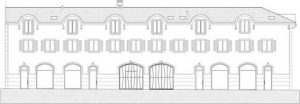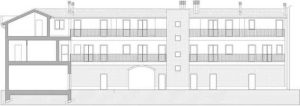
CORTE BALANSIN
il fronte principale, cadenzato da cappuccine a volta ed elementi ad archi ribassati, si conforma nella scelta tecnica dei materiali alle ragioni di congruenza con la tipologia edilizia e con le caratteristiche architettoniche dell’intorno. il fronte interno prevede l’uso del laterizio e del mattone paramano, in tutte le sue varie combinazioni, ed abbina scelte ehi diche ad alte prestazioni tecnologiche, legate sia alla durata ed inalterabilità dei materiali, che alle prestazioni dell’intero edificio. Il complesso residenziale, sorto all’interno di un’area centrale del tessuto urbano consolidato nella città di Sesto San Giovanni, si caratterizza per essenzialità dell’impianto e dei caratteri architettonici. La disomogeneità dell’ambiente circostante, che vede un’ampia zona di vecchie costruzioni con pianta a corte fronteggiare, in contrapposizione, edifici in linea e a torre a più piani, ha indotto l’arch. Magni ad optare per una scelta di omogeneità con le memorie storiche preesistenti (le corti). Utilizzando i modelli tradizionali si sono rielaborati morfologicamente i tratti storici del costruito con una architettura attuale e capace di inserirsi in modo organico in un contesto già maltrattato, per ricreare un nuovo equilibrio nel tessuto edificato.
the main facade, with regularly spaced arched dormer windows and elements with seqmental arches, is coherent in the technical choice of materials with the building style and with the architectural characteristics of the surroundings. The interior facade uses brickwork and facing bricks in all their various combinations coupled with high technological performance aesthetic choices, linked both with the duration and stability of the materials and with the performances of the whole building. this housing complex, built within a central area of the consolidated urban fabric of the city of Sesto San Giovanni, is characterised by the semplicity of the layout and of the architectural characteristics. The lack of uniformity of the sorrounding environment, where there is a large area of old constructions built around courtyards facing, in contrast, buildings erected along the roads and tower blocks with several storeys, induced mr. Magni to opt for reviving the pre-existing historical memories (courtyards buildings). Using traditional models, the historical tratte of the building were morphologically reinterpreted with a modern architectural style that is able to fit organically into a context that ib already neglected, to recreate a new balance in the built fabric.


















